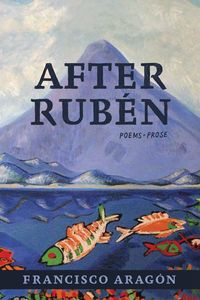
Part love letter, part literary history, After Rubén spans decades and continents to pay lyrical homage to the eponymous muse behind the collection, the late 19th-century Nicaraguan poet Rubén Darío.
To celebrate the book’s publication, the fruit of ten years of writing, author Francisco Aragón and the Institute for Latino Studies, in collaboration with the Creative Writing Program, will hold a virtual book launch on Wednesday October 28th. Fellow writers Brenda Cárdenas, Maria Melendez Kelson, Michael Nava, Urayoán Noel, and Notre Dame MFA candidate Misael Osorio-Conde will also participate with readings of their own work.
The event will be streamed simultaneously on the YouTube and Facebook Live channels of publisher Red Hen Press from 7 to 8 pm. The multi-reading affair reflects the collective ethos that Aragón says characterizes his poetic process, as well as his identity as a diasporic, Latinx writer.
“By inviting these fellow poets and writers to participate, I’m hoping to convey that my work emerges from, and is tied to, being a part of a particular community,” he says. “I’ve had a special connection with these five writers going back a number of years.”

After Ruben follows two previous collections: Glow of Our Sweat (Scapegoat Press, 2010), and Puerta de Sol (Bilingual Press, 2005). Aragon is also the editor of the anthology The Wind Shifts: New Latino Poetry (University of Arizona Press, 2007).
A native of San Francisco, he is on the faculty of the University of Notre Dame’s Institute for Latino Studies (ILS), where he teaches courses in Latinx poetry and creative writing. He also directs the ILS’s literary initiative, Letras Latinas, which he founded in 2004.
In invoking one of the most important Spanish-language writers of the late 19th-century as the poetic axis of this most recent book, Aragón is at once touching back to his cultural heritage as the son of Nicaraguan immigrants and reconfiguring Darío for a new generation of readers.
Particularly with his collections Azul and Prosas profanas y otros poemas, Darío is considered to have ushered in modernismo, a Latin American movement of poetic expression characterized by innovation and rupture with more established forms -- for example the decima, a ten-line, octosyllabic verse composition with origins in 16th-century Spain that holds a similar spot in Spanish-language writing to sonnets in Anglophone poetry.
Ten of Aragón’s poems in the collection are unconventional translations of Darío, such as “I Pursue a Shape”, an English version of “Yo persigo una forma.” Then, in the appendix, these ten Darío poems appear in their original Spanish, including several focused on figures in U.S. literature and politics, reflecting the hemispheric and transatlantic concerns of the collection.
Indeed, translation appears as a recurring motif, as does bilingualism, reflecting Aragón’s upbringing and his concern with both Spanish and English-language traditions of verse-making.
After Rubén is also a tribute to the poet’s father, memorialized in several poems as well as in the prose piece “Gloria’s”, which describes the uncomfortable truth of the poet’s father’s previous marriage and his relationship to his first-born daughter. At another moment, Aragon recalls how his mother would read Darío’s verse to him as a child, bringing a sense of circularity and rootedness to the composition.
Yet After Rubén also reaches for myriad moments and spaces in Aragon’s life, from Keough Hall at the University of Notre Dame during the 2016 election, to the Fort Wayne recalled by a waitress telling the story of how her husband was deported to Mexico, leaving her a single mother of three.
Ultimately, of course, it is Darío who appears as the central figure, epitomized in the concluding section, an essay titled “My Rubén”, and in the poem “Because They Lived Abroad”, in which the poetic voice holds communion with the ghosts of Darío and the Peruvian Cesar Vallejo in their Parisian haunts of the century past.
In keeping with Darío’s penchant for public-facing critique, political boogeymen relegated to recent U.S. history resurface in poems like “To George W. Bush” and “Poem with a Phrase of Isherwood.” The last two stanzas of the latter strike a balance between incisive take-down and ambivalent tenderness in revisiting Arizona’s infamous anti-immigrant SB 1070 law and Sheriff Joe Arpaio:
“Cruelty is sensual and stirs you
Governor, the vision of your state
something you treasure in secret
though we’ve caught a glimpse
in the jowls of your sheriff:
bulldog who doubles as your heart.”
In this way, the collection shows the intertwined currents of politics, poetics, and culture. It’s also interested in erasure, particularly of queer voices.
As Aragón shares in an interview with fellow writer Ruben Reyes Jr. for The Rumpus magazine, the collection was inspired in part by written correspondence between Darío and the Mexican poet Amado Nervo. In November 2012, Arizona State University announced it had acquired about 900 handwritten pages of writing from Dario, including nine letters addressed to Nervo. These, according to Darío scholar Alberto Acereda, confirm an intimate relationship between the two.
A subsequent denunciation of the correspondence as fake by at least one prominent Nicaraguan writer followed. To this, Aragon attributes conventional homophobia and critics' tendency to ignore Dario’s sexuality. He takes up the polemic in “January 21, 2013”, with epistolary verse channeled through Darío and directed at one detractor in particular, the novelist Sergio Ramírez:
"I’m waiting for the day when you,
the world, stop fighting it. I am
dead, and the dead are very patient.
Love,
Rubén"
Visit the event page for more details about the Wednesday Oct. 28 book launch.